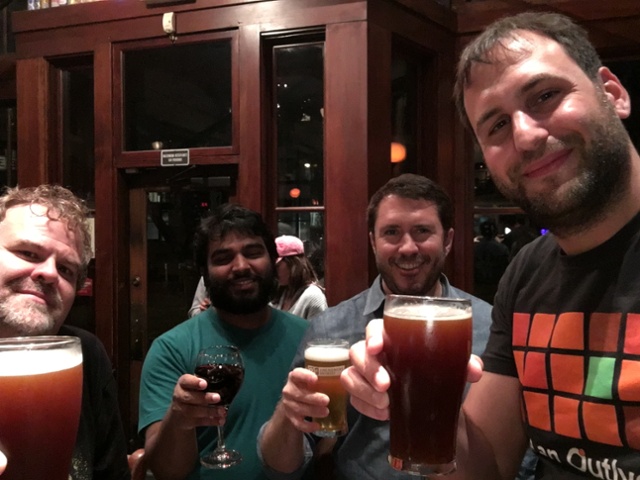Although this started out as a general DevOps meetup for September, after our call for speakers it turned out that everyone wanted to talk about Kubernetes! Kubernetes deployments, Kubernetes Networking and Kubernetes storage. This was my first DOXSFO after being away all summer in London and reconnecting with our original meetup we started there, DOXLON, and it was great to see how far our San Francisco meetup has come along since I last attended!
At our London meetup, our normal routine is to go to a pub after the meetup and open a tab to hang out until midnight with the attendees. However in San Francisco, I found everyone just goes home when the meetup finshes, so I was particularly happy that our 2nd speaker Christopher, and a couple of attendees came out for a beer afterwards. I hope we can make this a regular thing at our San Francisco meetup going forwards!

Check out their talks below. And we hope to see you at the next event!
Automating application lifecycle on Kubernetes
Sidhartha Mani , Founder @ Caascade Labs
In this talk, Sid talks about the challenges of running complex workloads on Kubernetes. Kubernetes recently introduced a new feature called Custom Resource Definition (CRD) that lets users extend Kubernetes. CRDs are one of the ways to achieve automation of the entire lifecycle of your applications running on Kubernetes. Sid shows a demo of a complex application that has been automated using CRDs and then talk about how organizations can leverage this feature for better reliability, and standardization.
Using Kubernete’s Network Policies
Christopher Liljenstolpe, CTO @ Tigera
So, you’ve deployed a bright shinny new k8s cluster, pushed your code and services, have the replication controllers auto-scaling and recovering like mad — life is good. Unfortunately, maybe a bit too good. You’ve got attention, and now the security folks are knocking at the door, asking how you intend to run this bright new shinny cluster through the firewalls to instill corporate policy. Let’s see, seconds to spin up a pod, days to get a firewall change ticket through — this isn’t going to work. What you need is some Kubernetes network policy. We’ll discuss this capability and show you how you can use it to meet (and exceed) organizational security requirements within the cluster, and even between the cluster and the rest of the organization.
Containerized storage for containers on OpenEBS
Murat Karslioglu, VP Solutions @ OpenEBS
What is wrong w/ stateful workloads on containers today? What is happening at the Linux kernel to improve the security of containers as a platform FOR storage? Could containers and Kubernetes become the foundations of a new approach to storage? Quick demo of the OpenEBS project.
This content came from DevOps Exchange San Francisco (#DOXSFO), a monthly DevOps Meetup in San Francisco.
If you’d like to speak at a future DOXSFO or join the Meetup, please visit the DOXSFO Meetup page.